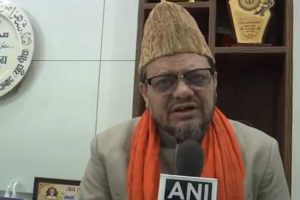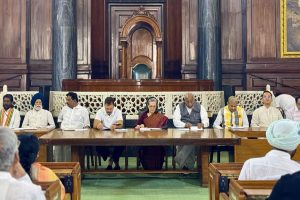The All India Muslim Personal Law Board (AIMPLB)’s call for Muslims to wear black arm bands in protest against the Waqf (Amendment) Bill, 2024, saw widespread participation during Alvida Jumma prayers across India, including in Lucknow, Hyderabad, and other cities.
In Hyderabad, AIMIM chief and Lok Sabha MP Asaduddin Owaisi, a member of the Joint Parliamentary Committee (JPC) on the Waqf Bill, was seen wearing a black arm band while offering Friday prayers. Visuals from Hyderabad showed hundreds of worshippers joining the symbolic protest alongside him. Police were deployed in parts of the city to ensure peace.
In Lucknow, AIMPLB member Khalid Rasheed Farangi Mahli, along with representatives from other Muslim organizations, also wore black arm bands during prayers.
Speaking to the media, Mahli stated: “The proposed Waqf amendment bill is not acceptable to us. Waqf is a matter of Muslim community rights, and changes to it could endanger Waqf properties. We had conveyed our concerns to the JPC, but they were ignored.”
The AIMPLB claims that 90% of Waqf properties include mosques, dargahs, and cemeteries, and fears that the amendments could threaten their legal status. Protests against the bill have already taken place in Delhi and Patna, with another major demonstration planned in Vijayawada on March 29, 2025.
The AIMPLB has clarified that the protest is peaceful, urging people to simply wear black arm bands during prayers and return home without street demonstrations.
The Waqf Act of 1995, originally meant to regulate Waqf properties, has been criticized for mismanagement, corruption, and encroachments. The Waqf (Amendment) Bill, 2024, proposes reforms such as:
- Digitization of Waqf properties,
- Enhanced audits,
- Increased transparency,
- Legal mechanisms to reclaim illegally occupied properties.
Despite these proposed changes, the AIMPLB has called the bill a “sinister conspiracy” aimed at depriving Muslims of their religious and charitable institutions. With growing opposition, the debate over the future of Waqf properties in India continues to intensify.





